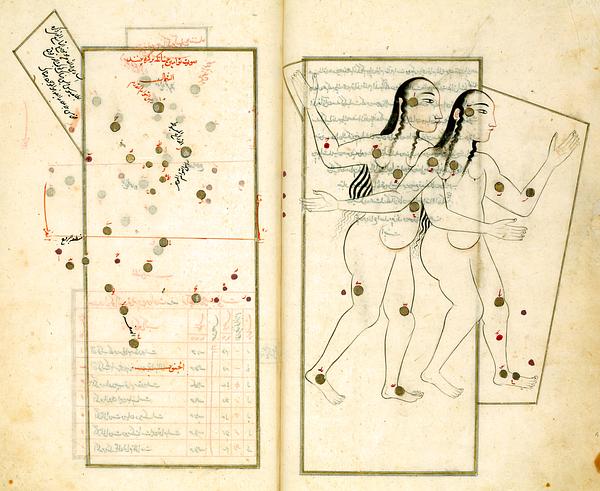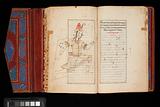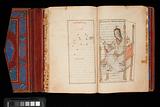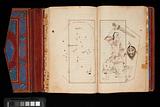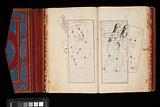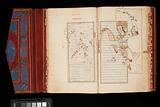‘The Constellation Gemini’. Miniature in an illustrated copy of al-Sufi’s Kitab suwar al-kawakib (The Book of Fixed Stars)
Iran; 1675
H: 24.5; W: 15 cm
Astronomy was important in the Islamic world through the Koran’s message that the stars were the work of God and because of the necessity to determine the time for fasts and prayers and to find the direction of prayer (qibla). Furthermore, it was vital for navigation. From the 9th century, data in translations of Antique Greek writings were compared with observations made in the Islamic world and the results were collected in new treatises.
The original work behind this copy of Kitab suwar al-kawakib is a catalogue in Arabic of constellations from 964, partly based on Greek models. The author, Abd al-Rahman al-Sufi (903-986), was court astronomer to the Buyid ruler Adud al-Dawla in Isfahan in Iran. This particular copy of the manuscript is dated the 8th of Dhu al-Qada, 1085 H, corresponding to February 4, 1675, and was copied by “Safar.”
Inv.no. 165/2006, fol. 19 recto - 18 verso
Inv.no. 165/2006, fol. 35 recto - 34 verso
Inv.no. 165/2006, fol. 39 recto - 38 verso
Inv.no. 165/2006, fol. 47 recto - 46 verso
Inv.no. 165/2006, fol. 78 recto - 77 verso
Inv.no. 165/2006, fol. 101 recto - 100 verso
Inv.no. 165/2006, fol. 119 recto - 118 verso
Inv. no. 165/2006
Published in:
fol. 78r and 77v
Lærke Rydal Jørgesen and Marie Laurberg (eds.): The moon : from inner worlds to outer space, Louisiana, Humlebæk 2018, cat.no. 13, pp. 80-81;
Stig T. Rasmussen: Klassisk arabisk litteratur i oversættelse til dansk: en litteraturhistorisk vejvisende antologi, København 2018, pp. 288-289;
